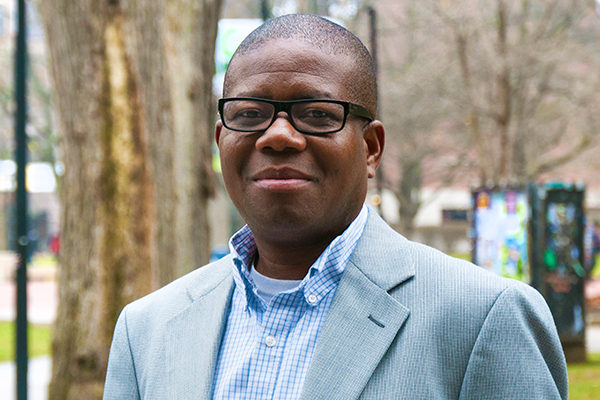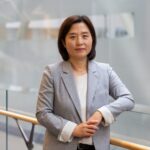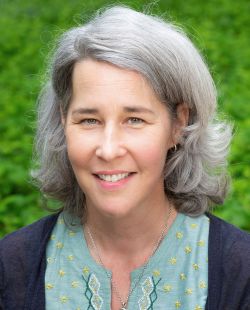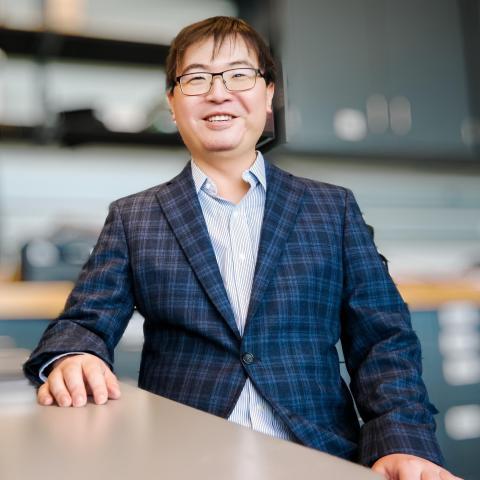
What has Omolade been researching lately?
Omolade Adunbi is a political and environmental anthropologist, Professor of Anthropology and Afroamerican and African Studies, Professor of Law (courtesy) and the Director of the African Studies Center. His new project is at the intersection of social media, energy practices, climate change and the politics of the environment. He is particularly interested in issues of energy justice and its interaction with climate justice in West Africa.
In 2022, Omolade published Enclaves of Exception, which dives into the free trade zones established by China’s trading partnership with Nigeria, reviewing the economic and environmental impacts of the oil-based economy.
Read more about Enclaves of Exception here.

What has Eunshin been researching lately?
Digital Twin Calibration with Big data
The advancements in numerical algorithms and computational power have elevated the role of
digital twins in strategic analysis and operational management in energy systems.
Fundamentally, a digital twin is a digital replica of a physical system or object. It is a computer-
generated model that serves a critical function in streamlined monitoring, forecasting, and in
conducting virtual world system tests. The utility of digital twins in energy systems can be
demonstrated in tasks such as optimizing the structural and operational controls of wind power
systems, managing the power consumption in building energy systems, and handling thermal
and AC control in electric vehicles.
The development of digital twins in energy systems often hinges on the application of physics-
based first principles and necessitates the accurate designation of numerous parameters.
However, certain scenarios prevent the accurate determination of these parameters via physical
laws, prompting domain specialists to resort to educated guesses. These assumptions, though
well-intended, can lead to significant discrepancies between a digital twin’s outputs and the
actual system’s performance.
To ensure the digital twins closely mimic their real-world counterparts, Professor Byon’s
research capitalizes on the power of Big Data. Concurrently, it caters to the research challenges
inferred from the sheer volume and complexity of the datasets. The project lays a strong
foundation for an efficient and resilient parameter calibration process by establishing a
quantitative scheme. This is achieved by harmoniously integrating data science theories and
cutting-edge tools within the data-driven optimization framework. It introduces an innovative
integrative stochastic optimization framework that rolls out a broad spectrum of solution sets
catering to various types of problems. This includes multi-dimensional, functional, and time-
variant calibrations, thereby offering both practical and theoretical implications.

Pamela Jagger
Professor of Environment and Sustainability; SEAS PhD/Postdoc Program Director


Wencong Su
Chair and Professor, Electrical and Computer Engineering
What has Wencong been researching lately?
Dr. Wencong Su is a Professor and Chair of the Department of Electrical and Computer Engineering at the University of Michigan-Dearborn. Dr. Su received his B.S. degree (with distinction) from Clarkson University, Potsdam, NY, USA, in 2008, his M.S. degree from Virginia Tech, Blacksburg, VA, USA, in 2009, and his Ph.D. degree from North Carolina State University, Raleigh, NC, USA, in 2013, respectively—all in electrical engineering. Dr. Su’s research is primarily centered around power and energy systems, transportation electrification, and cyber-physical systems. Dr. Su is a Fellow of IET (Institution of Engineering and Technology) and a Senior Member of IEEE (Institute of Electrical and Electronics Engineers). An accomplished author, Dr. Su has penned one book, four book chapters, and over 150 high-quality articles in prestigious international journals and peer-reviewed conference proceedings. Dr. Su has been consecutively recognized as one of the Top 2% Scientists Worldwide by Stanford University. Moreover, Dr. Su holds editorial roles at several prestigious journals, including Associate Editor positions at both IEEE Transactions on Smart Grid and IEEE Access. He also serves as an Editor for IEEE Power Engineering Letters and Associate Editor for IEEE DataPort. He was the Guest Editor-in-Chief of IEEE Transactions on Smart Grid – Special Section on Power—Electronics-Enabled Smart Power Distribution Grid in 2020-2021. Dr. Su’s research work has been sponsored by the U.S. National Science Foundation (NSF), Department of Energy (DoE), Advanced Research Projects Agency–Energy (ARPA-E), Department of Defense (DoD), DTE Energy, Ford, Toyota, DENSO, Michigan Economic Development Corporation, Michigan Translation Research and Commercialization (MTRAC), DoE National Labs, and many other partners. He serves as the campus director of the Center for Electric Drive Transportation (2015-2023) and NSF REU Site (2018-2022) at the University of Michigan-Dearborn. He also serves as an associate director of Dearborn Artificial Intelligence Research Center (2020-present).
In the past two years, Wencong has become interested in energy justice. His team has been developing an interactive mapping tool to visualize “utility redlining” or energy equality using publicly available data (e.g., historical redlining maps, EV charging locations, solar and wind project information, aggregate energy usage, power outage maps). This interactive tool strives to provide data-informed recommendations to utilities, policymakers, and a more comprehensive range of audiences which include affected underserved populations.
